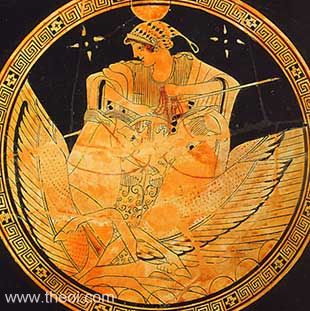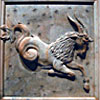Ongoing series of building characters using astrology and the Tarot--for writers or for fun.
Did you think that the Easter Bunny was a modern invention
to sell candy at Easter? Yes and no. It is said there is nothing new under the
sun, only re-purposed, and so it is with the Easter Bunny.
Before the Christian festival of spiritual rebirth, Easter, there
was the festival of Eostre or Ostara. She was the lunar goddess after whom the
springtime Paschal (i.e. Passover) festival is named.
 The brothers Grimm tell us that Eostre is related to Old
High German ostar, the adverb expressing movement toward the rising sun.
Ostara/Eostre seems to have been a divinity of the radiant dawn, of new birth
in the spring. You can see why it was adapted to the resurrection of the
Christ (Easter).
The brothers Grimm tell us that Eostre is related to Old
High German ostar, the adverb expressing movement toward the rising sun.
Ostara/Eostre seems to have been a divinity of the radiant dawn, of new birth
in the spring. You can see why it was adapted to the resurrection of the
Christ (Easter).
Now, for that wacky
wabbit (and, yes, we will get to Aries). According to various sources,
Eostre had a hare as a totem animal and she could take that form. If you want
more about this ancient history on origins of eggs, Lent, fertility, and
rabbits as related to springtime and Easter, I suggest you take a peek at Association of Polytheist Traditions.
So, hare/rabbit/Eostre/Easter/eggs/new birth/spring-all re-purposing.
Okay, Aries is the first sign of the zodiac, a fire sign,
and on its positive side, is indicative of birth,
growth (energetic, adventurous, ambitious, enthusiastic, dynamic, confident
and quick-witted)
or
in completing that cycle—death
and regeneration (exemplified by selfishness, quick-tempered, impulsive,
impatient, foolhardy and a daredevil).
Aries characters make courageous leaders but not good
followers because of their “take charge” personalities. Their immense energy
can make them aggressive, restless and head strong. It is their job to get
things moving, lead the charge, begin the project but they may be unwilling to
obey or submit to directives from others of which they disagree.
If you’re writing a werewolf character, Aries is the leader
of the pact with strong personal magnetism. Or maybe you need a leader for a
group of people isolated in a Sci-fi world after a global catastrophe—pure bliss for an Aries
who loves all the new possibilities. He or she is someone who can ‘rally the troops’ and
forge ahead. The conflicts come when Aries tries to force his way on others
who may not agree. The Ram is Aries symbol and represents the driving energy of pushing
ahead and having the last word.
Arians can be frank, direct and candid. They make enthusiastic
and generous friends. Their fearlessness is commendable as they forge new
inroads. If you want to use Aries to build character, you might want to take a peek at these sites for more details:
Let's quickly bring in The Emperor and
The Tower cards of the Tarot. They
both help explain Aries.
 The Emperor card
depicts a mature ruler sitting on a throne which is decorated with the figures
of rams. Mature is the operative word
here. It is what Aries strives to be; authoritative with
responsibility—examining situations from an organized and rational perspective.
Think King David of the Bible. (I don’t know if he was an Aries, but he could have
been—his earlier days were indicative of Aries wilder nature before he
channeled his energy into positive action and wisdom took hold)
The Emperor card
depicts a mature ruler sitting on a throne which is decorated with the figures
of rams. Mature is the operative word
here. It is what Aries strives to be; authoritative with
responsibility—examining situations from an organized and rational perspective.
Think King David of the Bible. (I don’t know if he was an Aries, but he could have
been—his earlier days were indicative of Aries wilder nature before he
channeled his energy into positive action and wisdom took hold)
On the other side of the coin (and there is always another
side), Aries can misuse authority and become reckless and impulsive. He is
great at starting new projects but following through is where he can break
down. There is the element of the child here—a refusal to grow up, so Aries must
learn mastery over his emotions in order to mature into his full potential.
 The Tower card
“refers to
The Tower card
“refers to
The Tower reminds Aries that he is his own worst enemy. It
symbolizes eradication of an existing status quo. It is a warning against
stagnation and ignorance and reminds Aries to continue evolving and growing out
of outdated structures of thoughts and emotions—purging the inner self (by fire) like the Phoenix Bird—and then like the Phoenix, he can rise from his ashes and rebuild anew. Astrology Scopes.
Do you know any Aries?
Do you have a place for this character in your novel?
Does the Tower card frighten you?











